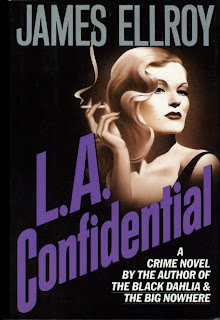"Did I ever tell you about the man who taught his asshole how to talk?"
- Doctor Benway
Long ago (okay, only about eight years ago), when I lived in a much more repressed set of circumstances, Naked Lunch came on the Sci-Fi channel. To me, it was that film that kept getting referenced on Farscape and had all the cool makeup effects. To my parents, it was an R-rated movie about a ton of disgusting sex, spousal homicide, psychotic episodes, and drug use. Yeah. We had those sort of cultural differences a lot. But my dad, after the umpteenth time I asked him if I could watch it, made a deal with me. If I read the book, I would be allowed to see the movie. He thought that would stop me. Instead, I exhausted every possible resource I had to find the book and read it. And boy, was I happy with what I read. While this wasn't the first book I'd ever read with nonlinearity and surrealism, it was the first book that felt like an experience. It was nasty, hilarious, dark, and scary all at once. It was dirty, sure, but the dirty nature of the book felt justified. It had its own style; a mix of tough-guy junkie slang, science-fiction dystopia, sex scenes by and for people completely detached from reality, and monsters that shouldn't even exist in the darkest corners of the mind. William S. Burroughs is quite literally H.P. Lovecraft on acid.
Naked Lunch tells the story of Bill Lee...sort of. Bill is a junkie who is about to get pinched in New York City. The cops have put an undercover officer in a white trench coat on him, as well as tracking him with a man named The Disk who sniffs out the junk in peoples' systems and pounces on them. So Bill flees, first to Mexico and then to countries that may be imaginary-- such as Interzone, Annexia, and Upper Baboonasshole. Throughout the book, though, the story becomes a guide to these rather nightmarish places through Bill's eyes (as there is really only one narrative voice, and it never tends to change), with such characters as psychotic cowboy A.J. (one of the few heroes in a sense), the memorable and incurably insane Doctor Benway, and the disgustingly hedonistic Hassan sometimes taking center stage. The various characters vie for control through a series of violent, shocking, and sometimes even explicitly sexual maneuvers that eventually (literally) rip the world apart to make sure they're the ones who're able to feed their addiction to power, while Lee seeks only to feed his own habits for drugs and company.
While seemingly easy to explain like this, the plot is all mostly implied and inferences from the book's structure. Things move in weird, rambling sketches from place to place, the ellipses in the text being the main way of telling when a scene's shifted mid-chapter. Despite this, the book is incredibly descriptive, each scene playing out in vivid, vivid detail. The details actually help immerse one in the book, and at the same time, help the book work its way inside your head. Naked Lunch is an experience, and that experience is mutual. Every time I read the book, I find different things, things I've missed, or things I hadn't thought of the same way as when I last read it. The thing unspools in insane, almost non-Euclidian ways, moving towards a cataclysm that, while not quite changing everything, does change quite a bit.
But despite all of this, the book is fantastic. It creates an atmosphere with a twisted sense of humor and a satirical look at what humanity will do if their addiction to control goes too far. It's crude and vile in certain aspects, but brilliant in others. While it's offensive, it's necessary, and when viewed with a sense of humor and a certain detachment, it's hilarious. Lee's tough-guy film noir tones give an interesting view of the vicious world he inhabits, and each of the characters lends their voice, creating a nasty but altogether amusing and interesting world. It's a book that's about the atmosphere as much as the plot or any characters, and overall it's brilliant. There's literally a whole world in there to explore, and every bit of it is actually worth spending time with.
While the insanity and grotesquerie aren't for everyone, and the hanging/sex scenes (supposedly an indictment of capital punishment) are a particular example of this, it's a book I'd wholly recommend. While many people who will take the book seriously may have difficulty seeing the humor, and while it would be very easy to get offended by this book, I'm proud to make it part of my personal collection, and one I'd read over and over again. Also, you'll learn what the words "Steely Dan" actually refer to, among a great many other quotes and references that have permeated the world's cultures. Every time I read it I discover something new, and it's meant different things at different times in my life. It's easily a classic in my book, and I am more than happy to recommend it to my audience and my friends alike. Read this book. You may not like it, but it's something everyone should at least try.
Next Week: Yet another dose of perversion and insanity (though in a more linear form) with Warren Ellis' Crooked Little Vein. It's good to see you all again, by the way.
.jpg)
.jpg)










